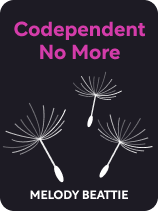

This article is an excerpt from the Shortform book guide to "Codependent No More" by Melody Beattie. Shortform has the world's best summaries and analyses of books you should be reading.
Like this article? Sign up for a free trial here .
What to know how to practice detachment? What tips does Melody Beattie suggest for practicing self-care? How should you handle setbacks?
If you are a codependent person, then practicing detachment and self-care are important steps in your recovery process. It’s important to detach yourself from a situation and reflect on how you feel in order to treat yourself with kindness and honesty.
Continue reading to learn how to step away from codependent behavior.
The Art of Detachment
If you want to know how to practice detachment, here are some tips from the book Codependent No More. According to author Melody Beattie, the most important way to practice detachment and self-care is to step back from a situation and ask yourself, “What do I need or want in this moment?” This lets you reflect on your emotional state, responsibilities, and energy levels before making a decision.
Beattie adds that there are a couple of principles to remember when considering your wants and needs. First, don’t shoot yourself down, even if you think a need or want is selfish or inconsequential. Be compassionate with yourself and remember that your wants and needs are just as important as everyone else’s.
(Shortform note: Furthermore, prioritizing your own needs and wants is not selfish—it is self-care. Selfishness involves taking things away from other people for yourself, while self-care is providing for yourself.)
Second, Beattie stresses the importance of being honest when you ask yourself what you need. Self-care can sometimes mean things like desserts, rewards, and fun outings, but it can also mean making that phone call, doing that task, or apologizing to that person.
[Shortform note: The key to honest self-care is finding a balance between celebrating your successes and acknowledging your shortcomings. Maybe you completed a project, but you also ordered takeout when you’re trying to eat healthily. Honest self-care celebrates completing the project, acknowledges the shortcoming of dinner, and makes a plan to improve in the future (maybe you need to prepare dinner earlier or cook in bulk on the weekends). You honestly assess your shortcomings, and you recognize the work you need to do to practice self-care.]| How to Practice Difficult Self-Care Providing for yourself and honoring what you need or want isn’t always fun, but there are some steps you can take to make difficult tasks easier. Break your difficult task into smaller, more manageable steps, speak encouragingly to yourself, and track your energy levels so you can schedule difficult tasks for when you’re most energized. For example, if you have to make a difficult phone call, you can break the call into a few steps, such as writing out the most important points and deciding where you’re going to make the call. If you know you’re more energized in the morning, you can schedule the phone call for right after breakfast, when you’ll be best able to handle the mental pressure. Right before the call, spend some time encouraging yourself. This will put you in a more positive mindset to complete your task. |
Ask for Help
Once you’ve determined your needs and wants, Beattie explains that the next step is to ask yourself, “What do I need or want from other people in this moment?” and then to actually ask them for it. Codependents struggle with this, as they would rather give help or attention than receive it, but learning how to follow through on your needs and wants is a vital step to self-care.
According to Beattie, one of the things everyone needs from others is positive attention. Pay attention to those needs and take steps to fulfill them. Asking for a hug is especially powerful, as hugging releases endorphins, which make you happier and more at ease. (Shortform note: Hugging also releases stress, lowers blood pressure, and boosts your immune system. In fact, hugging is so important to your health that doctors recommend a minimum of four hugs a day.)
If you have difficulty asking for or finding someone to give you positive attention, Beattie suggests getting it second-hand through your own actions. Try giving out compliments. Make sure they’re honest, but give them out freely. It’ll make both you and the other person happy.
(Shortform note: It may seem backward to give someone else compliments when you’re craving positive attention. However, studies show that complimenting other people boosts your own mood. In addition, people tend to mirror behavior, so if you start complimenting or paying attention to another person, they’ll be more likely to reciprocate.)
| Asking for Attention Doesn’t Make You Needy Codependents find it difficult to ask for help because they haven’t been able to rely on others in the past and they want to avoid being a burden. Asking for positive attention can be even harder because it requires emotional vulnerability. In addition, many people are afraid of appearing needy or “attention-seeking.” However, needing positive attention is a normal part of the human experience. Everyone needs support and care, and there are a few ways you can go about asking for it. Taking a five languages quiz is a great way of opening up a discussion about your needs because it’s a more lighthearted way of addressing a serious topic. These quizzes can help you identify what kind of affection you’re craving by explaining the different kinds and how they manifest, which will help you meet those needs. When asking for positive attention, don’t criticize the other person for not noticing your needs. Many people feel like their needs are obvious to others, but this is rarely true. Focus on the positives and be clear about what you need, rather than passive-aggressive. |
Prioritize Yourself
According to Beattie, an important part of self-care is prioritizing yourself. When other people ask you for help, consider yourself first. Do you have the energy, time, and resources to help? Is this a responsibility? Do only what you’re responsible for and comfortably can, and try not to feel guilty if that’s not perfect or exactly what the other person wanted. If the problem isn’t your responsibility to fix, then you’re doing yourself and the other person a favor by refraining.
This might seem counterintuitive since you’re refusing the other person’s request. However, Beattie explains that codependents often end up in maladaptive cycles of behavior. You take care of someone else’s responsibilities and they in turn neglect those responsibilities even more.
In these cases, Beattie maintains that refusing to take on those responsibilities will lessen your stress and allow you to focus on your real duties, and it’ll help the other person by forcing them to take responsibility for their own life. The other person probably won’t see your refusal in this positive light, but in the end, you’ll both be healthier and more balanced individuals who can take care of yourselves.
(Shortform note: People react badly to being refused, even if the refusal is good for them, as Beattie suggests is the case in codependent relationships. Your refusal means the other person has to take responsibility for themselves, and if they’ve shirked responsibility for a long time, they’re going to react negatively. To encourage them to take responsibility while minimizing pushback, be an example of personal responsibility yourself. Be very clear that you expect them to take responsibility, and reward them when they do.)
| The Importance of Saying “No” As discussed previously, saying no to people—in essence, what Beattie is advocating here—is not selfish. You’re not taking anything away from someone by denying their request. That said, saying no can still feel hard, especially if you’re not used to doing so. In Essentialism, Greg McKeown provides tips on how to say no: 1. Remember that rejecting the request isn’t the same as rejecting the asker. 2. Remember why you’re saying no. 3. Be clear with your answer. McKeown also suggests phrasing your answer gently, without outright using the word “no.” Beattie contradicts this, saying that being clear and asserting your right to say “no” is important. Beattie’s advice is especially true for codependents first starting their healing journey, as they’re just learning to prioritize themselves. As you grow used to prioritizing yourself, you can move to gentler phrasing. |
Miscellaneous Tips on Detachment
Now that we’ve covered the basics of how to detach and practice self-care, here are some final tips on how to succeed in the process.
According to Beattie, detachment often involves distancing yourself from hurtful past experiences and, in the process, practicing forgiveness. Some codependents don’t do so, instead holding on to their anger. Allowing yourself to feel angry is healthy, but don’t let it stop you from detaching. Remember, detaching is about you. The person who hurt you may deserve your anger, but you don’t deserve to have your autonomy taken away by them.
(Shortform note: Beattie focuses on the psychological effects of forgiveness: specifically, that forgiving someone lets you control your life rather than letting anger dictate your actions. However, there are significant physical benefits that come from forgiveness as well. When you hold on to anger, your body reacts like you’re sick and produces high amounts of white blood cells. Forgiveness allows your body to return to a healthy state.)
Handling Setbacks
Beattie also stresses the importance of being gentle with yourself when trying to detach. You’re teaching yourself a new way of thinking by putting yourself first, and that takes time. Setbacks are therefore a normal part of the healing process, and you should forgive yourself when you experience them. Setbacks can manifest in a variety of ways, including a return to maladaptive coping mechanisms, ignoring your needs, or getting into a relationship with another addict.
Beattie warns that setbacks are painful and upsetting, and you may wonder if there’s any point in trying to heal when experiencing one. There is. Every time you get up after a setback and keep working toward healing, you’re making progress and training your brain to put your needs first.
| How to Handle Setbacks How can you handle setbacks? Beattie doesn’t say, but we have a few tips for handling them healthily: 1) Remember how far you’ve come since the beginning of your recovery. Experiencing a setback makes you feel like your efforts to heal were useless. Remember your experiences before you started healing. You’ll be relieved to remember how much better you’ve gotten at taking care of yourself. You’ll also be motivated to keep going, as you’ll remember that progress is possible. 2) Go back to the basics of recovery. You might’ve moved past basic coping mechanisms like asking yourself what you need and want as you recovered. Going back to these principles will reinforce the foundation of your recovery and make you more confident. 3) Schedule easy and fun activities to boost your mood. This will give you a boost of happiness and confidence to help you through the setback.You can also plan ahead for setbacks. When you’re having a good day, try writing yourself “rainy day letters”: Write about how great your good day is and include plenty of encouragement for the next time you experience a setback. |

———End of Preview———
Like what you just read? Read the rest of the world's best book summary and analysis of Melody Beattie's "Codependent No More" at Shortform .
Here's what you'll find in our full Codependent No More summary :
- What inspired codependency 12 Step Programs around the country
- Explanations, advice, and compassion for people struggling with codependency
- How to practice detachment, self-care, and personal responsibility






